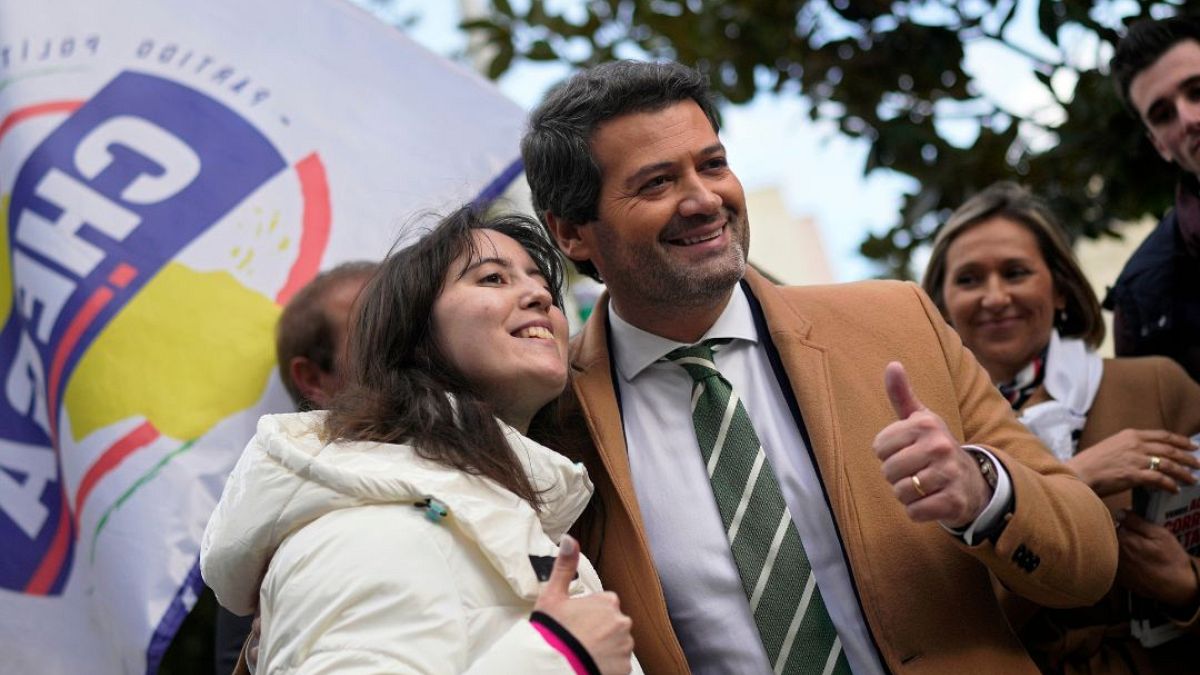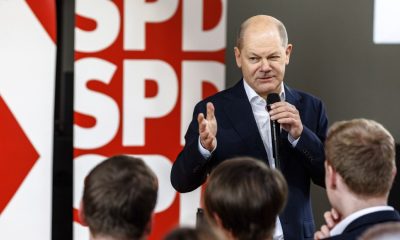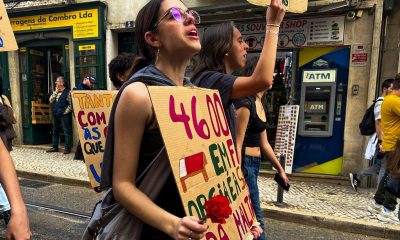General News
50 years after Portugal’s dictatorship, the far-right is seducing the country’s youth

Portugal’s far-right Chega party made historic gains in the country’s national elections held in early March. Taking 18% of the vote, the party sought to seduce Portugal’s youth, in a year which marks 50 years since Portugal overthrew its dictatorship.
André Ventura, the leader of Portugal’s far-right party is popping red balloons with darts, under a sign which reads “Socialism explodes in Portugal”. He is celebrating the gains made by his political party “Chega” (“Enough” in Portuguese), at Futurallia, Portugal’s biggest student fair.
Chega came third in the snap elections held in early March, surging from 12 to 50 seats. The rise of the far-right comes as the country marks 50 years since the right-wing military dictatorship led by Antonio Salazar was overthrown.
A crowd of young people aged between 15 and 18 years old are cheering him on. This moment is being recorded and will later be shared on the party’s social media accounts – namely TikTok – where the party and its politicians have amassed a large following.
18-year old Tiago watches on, his face hidden behind a mask of André Ventura, “it’s funny that they even thought of handing out masks. I know Ventura isn’t the perfect candidate, but he’s trying to change things, and that’s why I voted for him.”
Besides him, 19-year old Joaqim who voted for the centre-right Democatic Alliance party – which won the elections – also wanted to be present, “I am originally from the Cape Verde, I think that André Ventura focuses too much on immigration. I didn’t vote for Chega but I think Ventura wants to make changes for the youth.”
Banking on “negative perceptions of immigration”
“There is a clear move from left to right for the young voter in Portugal. Young men with lower levels of education voted for Chega in the highest numbers,” explains Antonio Costa Pinto, Professor at the Institute of Social Sciences, University of Lisbon.
Once his show of darts is over, André Ventura heads for the exit. His every move is calculated as he stops to take selfies with fans. But there’s one thing that he can’t control: his opponents.
“You are fascists”, shout a group of young people at the edge of the crowd. “Chega, Chega, Chega”, reply his supporters.
16-year old Inez watches on, “I would never vote for him. Portugal had a dictatorship under Salazar, so it’s frightening to see this today. I don’t feel safe around these people.” Her friend Raquel, worries about her future, “I see a lot of teenagers in this crowd, but one day they’ll be able to vote.”
A hate group, according to NGOs
According to anti-discrimination organisations, Chega represents a threat to minorities, with the Global Project Against Hate and Extremism labelling the party a hate group.
“Chega is a form of propaganda because they wash away the racist ideas. People usually say they are voting against the system because they are tired of politicians. But it’s a vote in support of racism and discrimination, which stands against minorities”, 20-year old Lou, an activist for the NGO SOS Racismo tells Euronews.
In 2020, André Ventura told a politician to “go back to her country”. He was targeting Joacine Katar Moreira, who is originally from Portuguese Guinea and had proposed a law for the restitution of art work to former colonies. Ventura has also targeted the Portuguese Roma community, claiming its members are “addicted” to welfare. During the COVID-19 pandemic he also called for a separate isolation policy for the community.
Young Chega activists
25-year old Ricardo Reis waits outside the Party’s headquarters, located a few hundred metres from the Portuguese Parliament. Wearing a sleek suit, he works in the tech industry in the daytime, but he spends his spare time campaigning for the party’s youth wing.
His grandfather may have been a communist, but Reis is willing to break with tradition to support Chega. The young activist also does not mince his words, using the term “parasite” to describe immigrants who obtain benefits, “we have a new type of immigration where you don’t see families coming for a better life or to integrate themselves into society.”
For Professor Costa Pinto, Chega has focused its campaign on exploiting negative perceptions of immigration, “in the last five years, there has been a new wave of immigration from South Asia, rather than the typical immigration from former Portuguese colonies. This new wave is essential for the Portuguese economy but negative perceptions relating to insecurity have allowed Chega to make political gains”.
The Portuguese region of the Algarve – which has an economy based on tourism – voted for Chega in the highest numbers, “this is a region where immigrants are central to the performance of the economy.”
Young politicians and activists
25-year old Rita Maria Matias who defines herself as an ‘anti-feminist’ and stands against abortion, was reelected to the Portuguese Parliament in March. Hailing from a political family, her father Manuel Matias, was the leader of Portugal’s defunct anti-abortion party, Pro Vida.
In 2021, the party adopted the slogan “God, country, family and work”, strikingly similar to Portuguese dictator António de Oliveira Salazar’s “God, country, family” motto.
“We have lots of people coming to us in secret, some have created tensions in their families in order to join the party. There are a lot of scars in Portugal but I’m not responsible for an authoritarian period during which I wasn’t living,” Matias tells Euronews.
Before her election, Matias was involved in the party’s youth wing and managed André Ventura’s Tiktok account. She was the party’s first female politician and its youngest, until 20-year old Madalena Cordeiro was elected last month.
“We are tired of feeling that in France, in England, in Switzerland, young people have more opportunities than in Portugal”, says the young politician who blames this situation on immigrants, “We are being replaced and nobody cares”.
For Matias, making ties with the rest of Europe’s far-right remains a priority ahead of June’s European elections. Jordan Bardella, head of France’s far-right Rassemblement National for the upcoming European elections “is a friend”, she says with a smile.
“Chega does not play the Eurosceptic card too much because they know that the European Union is quite popular in Portugal, because it is associated with economic development,” says Professor Costa Pinto.
Source
Disclaimer: No copyright infringement intended. All rights and credits reserved to respective owner(s).






















